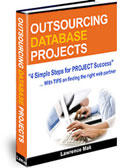MS Access
| Questions |
What Is Microsoft Access?
Advantages of Microsoft Access
Disadvantages of Microsoft Access
When to Opt for Microsoft Access
Microsoft Access: An Easy Access to Databases
| Are you concerned about managing your clients’ data and study it to further your profits? Do you want to set up a low cost database management system with a minimal learning curve? Are you a new start up with a small budget for databases? |
No matter which of the above problems applies on you, MS Access could be the possible solution for you. Coming with a superb compatibility with Microsoft products and other leading databases such as Oracle or MySQL, Microsoft Access is the stripped down version of a database and the ideal choice for a small enterprise.
What Is Microsoft Access? |
top |
Microsoft Access is a database management system with a much needed graphical user interface for beginners. Its huge inventory of options and templates make designing application software extremely easy. It makes use of Visual Basic for Applications (VBA) as its programming language and supports SQL as well.
While it looks a lot like Microsoft Excel, MS Access is an evolved application with greater flexibility and utility. It’s easy to share and work on, in small numbers, and template macros give its users decent controls. It is, however, not the ideal choice for advanced programmers or large businesses. Its performance is limited to small data size, usually less than 2 GB!
Advantages of Microsoft Access |
top |
Microsoft Access delivers much more that what a user would expect at the first glance. Even though it fails to perform when data or usage is high, it performs surprisingly well for a small enterprise with under 50 active users. Here are its advantages:
- Low learning curve required: As MS Access comes with a well integrated GUI, the learning curve is extremely lower than other databases. VBA is easy to learn as well.
- Cross compatibility and team work: This has become the salient feature of all MS products? They let you export and import files across applications and thus offers greater control. With Sharepoint, the entire team can work on the same file at the same time.
- Single File save: This decreases the size consumption of the database. All changes are saved to one file which also makes it easier to backup.
Disadvantages of Microsoft Access |
top |
Limited by higher controls, MS Access has some disadvantages such as:
- Multi-user limitation: Not many users can work on the file at the same time. It’s limited to under 50 people when low bandwidth is used. The number goes down as bandwidth usage increases.
- Data size: File size cannot exceed 2 GB.
- Speed: Since MS Access cannot handle large data sizes, its speed suffers to a point of being irresponsive when the data size and number of users go up.
When to Opt for Microsoft Access |
top |
You should opt for Microsoft Access when time for deploying a database, number of users and demand for higher controls is less. MS Access is a good stepping stone towards more powerful databases such as MySQL or MS SQL. Although it lacks scalability, it does offer the ease of use that a small enterprise may require initially.


